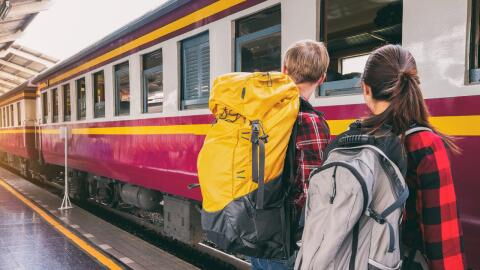As temperatures drop and the UK is set to face even more bad weather later this week, we all need nice things to look forward to. Halloween is over, and we’re now on the long and cold stretch towards Christmas. However, if your winter treat-yourself moment involves you zooming off to a new destination, you should be aware of some major travel scams that are currently circulating.
Discover our latest podcast
Around 40 million adults were targeted by scammers in the first quarter alone of 2023, according to Citizens Advice. To avoid ruining your trip by getting scammed by savvy fraudsters, learn how to protect yourself with the following tips from the travel and luggage storage experts at Bounce. Better safe than sorry!
How to spot a scam
It is, of course, very difficult to know when you are being scammed. However, it’s useful to know what fraudsters often go for. According to Bounce, you should be weary of ‘passport fast-tracking offers, rushed holiday deposit payments, fake holiday listings and highly discounted holidays’. These often come through fake emails, texts, calls, or social media posts and online adverts.
As for how to recognise a fake website, experts recommend you check the URL starts with https:// rather than a scammer’s favourite http:// - this difference is very easy to overlook. Lastly:
Ensure the website you use includes a padlock icon to the left of the URL. By clicking on the padlock, you will be able to see whether the website you are making your booking from has a valid security certificate.
It’s also important to check reviews for travel agencies, accommodations or transfers that you are looking to book. If you have a niggling feeling something isn’t right, you can speed up the process by searching for ‘scam’ or ‘complaint’.
Secured networks and payment method
You should also be careful with what internet connection you use when booking your holiday:
Booking a holiday, luggage storage, or other means of travel on public Wi-Fican result in additional security issues. Data shared across public Wi-Fi is often unsecured and can therefore lead you to a greater risk of online scams.
If you are not at home, it is better to use mobile data if you can. If you are using public wifi, avoid disclosing bank account details and remember to click ‘forget network’ once you have finished.
As for the payment itself, if you can use a credit card or PayPal, you’ll be provided with ‘considerably better fraud protection’. You can also ‘check to see if a company is ABTA or ATOL protected, for additional financial security’.
Once all this is over and done with, you can pack for your holiday in peace. Enjoy wherever you are off to and don’t forget your passport on your bedside table!
Read more:
⋙ Millions of android users warned over Google Chrome - check if your phone will be affected
⋙ Motion sickness: This is why you don’t feel too well when travelling
⋙ 3 strange protocols the Royals follow when travelling abroad
Sources used:
Bounce: Luggage storage London
Forbes advisor: Scams To Beware In 2023















